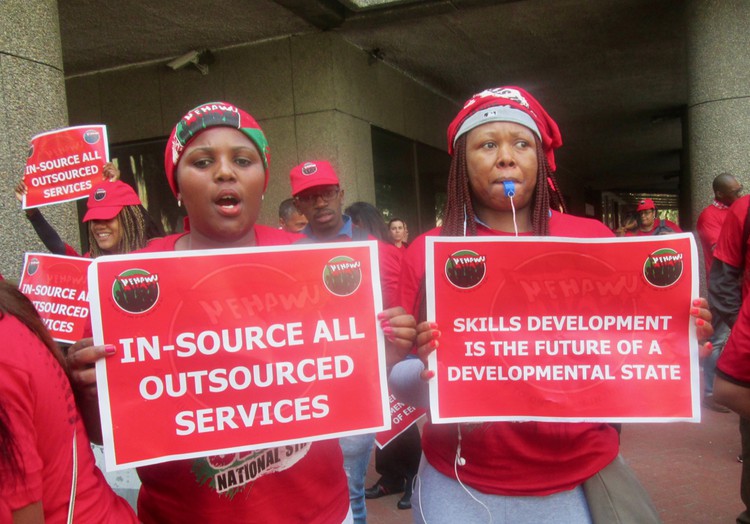SARS employees on strike over wage dispute
Labour action starts day before 2017/18 filing deadline
On Thursday, the day after President Cyril Ramaphosa announced Edward Kieswetter as the new commissioner of the South African Revenue Service (SARS), employees at the tax authority started a nationwide strike. It is also the day before the deadline for filing for the 2017/18 tax year and for provisional corporate income tax payments.
Officials GroundUp spoke to said that SARS points at entries to the country at the international airports and the borders with Lesotho, Zimbabwe and Mozambique were closed.
About 150 people picketed at the SARS branch in the Durban city centre. And in Cape Town about 100 employees picketed at the SARS offices on the Foreshore. Employees from the Bellville office also participated. A union member said that the queue for SARS had been extremely long at 6am in the morning, but by the time we arrived there was no queue, probably because people had given up.
The strike follows a wage dispute. A NEHAWU statement said that negotiations at SARS for the 2019/20 financial year started in November 2018. A deal could not be reached and the CCMA was asked to intervene. NEHAWU’s key demands are for an 11.4% salary increase, a long-service benefit and better family responsibility leave. The union claims it revised its position during the CCMA mediation but SARS management did not, leading to a notice to strike on 20 March. Subsequent meetings with SARS management also did not resolve the disagreement.
A SARS press statement confirmed that it had reached a deadlock in negotiations with the PSA and NEHAWU. SARS said it tabled a proposal that would see top performing lower-earning SARS employees receive increases up to 9.2%. Also, no employee would receive an increase of less than 5.2% (inflation plus 1.1%). This proposal was rejected by the unions which insisted on an across-the-board increase of 11.4%.
But SARS also said the only remaining point of difference was the length of time covered by the agreement. SARS wants it to cover a longer period than the unions are willing to concede. “Since this was a settlement offer, the rejection by organised labour of a multi-term agreement, left SARS with no option but to revert to its previous position of 7% across the board increase at single term,” read the statement.
However, SARS said, if the unions consulted their members and they accept the offer of 8% across the board, and CPI plus 1% in subsequent years, the dispute will be resolved.
Support independent journalism
Donate using Payfast

Don't miss out on the latest news
We respect your privacy, and promise we won't spam you.
© 2019 GroundUp.
This article is licensed under a Creative Commons Attribution-NoDerivatives 4.0 International License.
You may republish this article, so long as you credit the authors and GroundUp, and do not change the text. Please include a link back to the original article.

